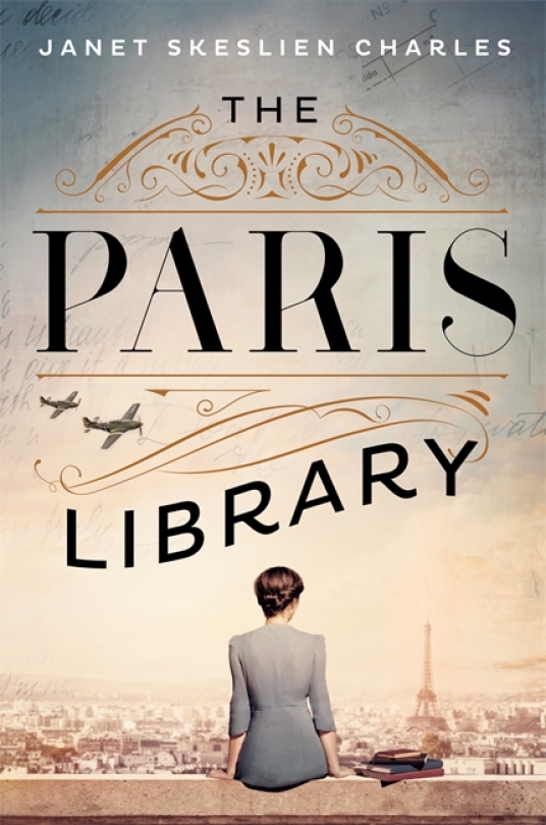The Paris Library
By Janet Skeslien Charles

Blurb
PARIS, 1939
Odile Souchet is obsessed with books, and her new job at the American Library in Paris - with its thriving community of students, writers and book lovers - is a dream come true. When war is declared, the Library is determined to remain open. But then the Nazis invade Paris, and everything changes.
In Occupied Paris, choices as black and white as the words on a page become a murky shade of grey - choices that will put many on the wrong side of history, and the consequences of which will echo for decades to come.
MONTANA, 1983
Lily is a lonely teenage desperate to escape small-town Montana. She grows close to her neighbour Odile, discovering they share the same love of language, the same longings. But as Lily uncovers more about Odile's mysterious past, she discovers a dark secret, closely guarded and long hidden.
Based on the true Second World War story of the heroic librarians at the American Library in Paris, this is an unforgettable novel of romance, friendship, family, and of heroism found in the quietest of places.
Our Review
The Paris Library is based on the true story of how librarians and volunteers for the American library in Paris used book distribution to stand up to the Nazis.
“Yes this war had divided us, but a love of literature would reunite us."
The Paris Library is a charming little book full of all the little quirks and descriptions that bibliophiles love but it is also character driven novel about friendship and betrayal.
The Paris Library is set in two different timelines and is mostly from the point of view of Odile and a young girl called Lily. Some of the other characters do pop up in there too for the odd chapter.
Odile is a young girl living in Paris prior to the WW2. She lives with her brother Remy, her mother, and her overbearing father. Odile’s dream job is to work in The American Library in Paris and when we meet her is on her way to an interview to work there. In preparation she is practicing the Dewey Decimal System which she often thinks in.
Odile and her brother Remy are very close, often united secretly against their father and his disparaging comments. Recently though Remy has been preoccupied with rumours of war.
“The only thing that made Remy forget his worries – which was to say the worries of others – was a good book.”
Once in the library Odile feels like she is home. She is a few minutes early getting to her interview and I loved her method of choosing a book.
“I ran my fingers along the spines. Choosing one, I opened to a random passage. I never judged a book by its beginning. It felt like the first and last date I’d once had, both of us smiling too brightly. No, I opened to a page in the middle, when the author wasn’t trying to impress me.”
The Directress of the Library Miss Reader is based on a real and impressive person, see the notes at the end of the book for more info.
One thing that endeared Odile to me was the internal dialogue that took place when she was asked her favourite author.
“Who’s your favourite author? An impossible question. How could a person choose only one? In fact, my Aunt Caro and I had created categories – dead authors, living ones, foreign, French, etc – to avoid having to decide.”
I think any true bookworm can understand the above quotation.
The author created a real sense of camaraderie between the characters within the library that helped me engage with the story and care about the outcome.
“It never mattered how low I felt someone at the library always managed to scoop me up and put me on an even keel. The library was more than bricks and books; its mortar was people who cared.”
The second timeline in the book is a young girl called Lily living in Froid Montana. Lily likes to snoop and is intrigued by her enigmatic and somewhat reclusive neightbour Mrs Gustafson.
“Her name was Mrs Gustafson, and she lived next door. Behind her back folks called her the War Bride, but she didn’t look like a bride to me. First of all, she never wore white. And she was old.”
When Lily’s mum becomes ill Lily gets the opportunity to know Mrs Gustafson better and their subsequent friendship is what made the book for me.
My only criticism of the book is that the ending felt a bit abrupt. I felt like after such a long book a bit more time could have been spent on it.
‘Libraries are lungs,’ she scrawled, her pen barely able to keep up with her ideas, ‘books the fresh air breathed in to keep the heart beating, to keep the brain imagining, to keep her alive.
Subscribers depend on it for news, for community. Soldiers need books, need to know their friends at the Library care. Our work is too important to stop now.”
Our Final Rating...
Read & Shared 31 Times.



Get In Touch
Please feel free to leave a comment to this book review below. Or even leave your own review if you like.
If you run a blog and/or have posted a review to this book, a Q & A or general author interview online you can always add a trackback to it here and following moderation we'll add a link to it below.